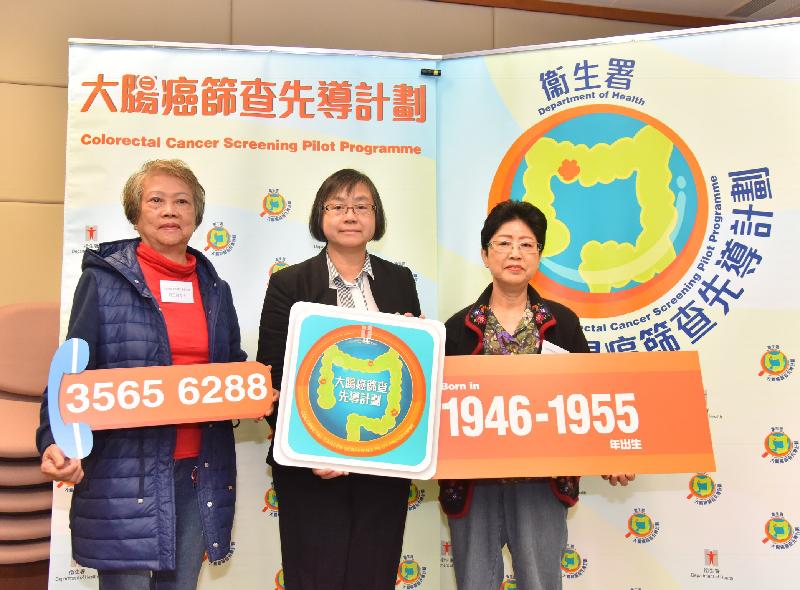DH to launch Colorectal Cancer Screening Pilot Programme Phase 3 (with photo)
*****************************************************************************
At a press conference today (November 20), the Head of the Surveillance and Epidemiology Branch of the DH's Centre for Health Protection, Dr Regina Ching, called on eligible persons to join the Programme as soon as possible. "Colorectal cancer is preventable through a healthy lifestyle and well-organised screening. Screening helps identify people who are more likely to have or already have the disease, so that treatment can be provided earlier to improve the chances of a cure," she said.
While the third phase will be extended to Hong Kong residents born between 1952 and 1955, eligible persons from phases one and two, i.e. those born in the years 1946 to 1951, who have not yet taken part in the Programme, can continue to do so, Dr Ching added.
She said, "Colorectal cancer has topped the list of cancer incidences in Hong Kong for three consecutive years. In 2015, there were 5 036 newly diagnosed colorectal cancer cases, accounting for 16.6 per cent of all new cancer cases, or about one in six new cancer cases. In 2016, colorectal cancer resulted in 2 089 deaths, accounting for 14.7 per cent of all cancer deaths, or about one in seven cancer deaths. It is the second most common cause of cancer death in Hong Kong, coming only after lung cancer."
The Government in September last year launched a three-year Pilot Programme to subsidise asymptomatic Hong Kong residents born from 1946 to 1955 to undergo screening tests in phases. As of November 17, 644 primary care doctors (PCDs) and 154 colonoscopy specialists (CSs) had enrolled in the Programme, with about 42 000 eligible persons joining as participants.
According to the DH's figures, in the first 12 months since the launch of the Programme, i.e. as at September 27 this year, of the 39 280 participants whose stool specimens were analysable, 5 286 (13.5 per cent) tested positive in the Faecal Immunochemical Test (FIT). Among them, 4 501 participants completed the colonoscopy examination, of whom 3 974 had polyps removed. Further examination of the removed polyps revealed 3 089 cases of colorectal adenomas and 291 cases of colorectal cancer.
Dr Ching said, "Close to 70 per cent of participants who had completed the colonoscopy examination were diagnosed with colorectal adenomas. By removing colorectal adenomas in the course of examination, such lesions are prevented from turning into cancer. Meanwhile, preliminary analysis of 55 colorectal cancer cases detected during phase one of the Programme revealed that most of such cancerous lesions belonged to earlier stages of the disease, giving the patients higher chances for better treatment response and a more favourable prognosis.
"The DH will closely monitor the Programme's implementation and progress and review the services regularly with a view to fine-tuning its operation."
The screening pathway of the Programme comprises two stages: (1) Eligible persons first make an appointment with an enrolled PCD. Upon enrolment, the participant will receive a government subsidy to undergo FIT; and (2) If the FIT result is positive, the participant will be referred by the PCD to receive a colonoscopy examination in order to find out the cause of bleeding. The participant may choose any CS enrolled in the Pilot Programme.
To encourage the participation of eligible persons and their completion of the screening pathway, the screening process is heavily subsidised by the Government. For FIT screening, the enrolled PCDs usually provide one consultation for each participant and arrange a second consultation only if the FIT result is positive. The Government will provide a subsidy amount of $280 for each consultation. As for the colonoscopy examination, the subsidy amount is $7,800 if no polyp is detected, while the amount will be $8,500 if polyp(s) are found and removed. The costs of the laboratory test for FIT and the histopathology are also covered by the Government.
Enrolled doctors, on top of the government subsidy, may charge more when providing specified services. While there is no cap on the copayment charged by enrolled PCDs, a cap of $1,000 is set on the copayment charged by enrolled CSs for the standard package of colonoscopy services.
Those who are interested in enrolling in the Pilot Programme can visit the thematic website at www.colonscreen.gov.hk for more information and the list of enrolled PCDs and CSs. They can also call the Programme hotline 3565 6288, which is manned by trained staff to provide a direct response to enquiries during office hours.
Eligible persons are also reminded to enrol in the electronic Health Record Sharing System (eHRSS) prior to joining the Pilot Programme. For details, please visit the eHRSS website at www.ehealth.gov.hk or call the Registration Office at 3467 6300.
Ends/Monday, November 20, 2017
Issued at HKT 17:05
Issued at HKT 17:05
NNNN





